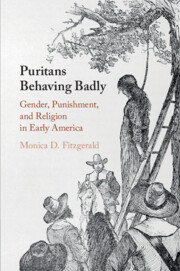Book contents
- Puritans Behaving Badly
- Puritans Behaving Badly
- Copyright page
- Dedication
- Contents
- Figures
- Tables
- Acknowledgments
- Introduction
- 1 The Great Hen Squabble and Regulating the Godly Path
- 2 Drunkards and Fornicators on Meeting House Hill
- 3 “Wicked Tongues and Wayward Behavior”
- 4 A “Blubbering” War Hero and the Middle Ground of Masculinity
- 5 “Unquiet Frame of Spirit”
- Conclusion
- Bibliography
- Index
2 - Drunkards and Fornicators on Meeting House Hill
Gendered Sin and Discipline
Published online by Cambridge University Press: 02 May 2020
- Puritans Behaving Badly
- Puritans Behaving Badly
- Copyright page
- Dedication
- Contents
- Figures
- Tables
- Acknowledgments
- Introduction
- 1 The Great Hen Squabble and Regulating the Godly Path
- 2 Drunkards and Fornicators on Meeting House Hill
- 3 “Wicked Tongues and Wayward Behavior”
- 4 A “Blubbering” War Hero and the Middle Ground of Masculinity
- 5 “Unquiet Frame of Spirit”
- Conclusion
- Bibliography
- Index
Summary
Chapter 2 analyzes how congregations charged men and women with different sins, defined sins in gendered terms, and created distinctive expectations for male and female confessions. By gendering sins, laymen created a different Puritanism for men than for women. First-generation ministers preached communal obligation and individual piety. As discipline increased through the second and third generations, the focus of sermons changed, emphasizing individual piety for women and communal responsibility for men, which contributed to the formation of different religious identities. By the third generation, women outnumbered men 3 to 2 in the feminized setting of the church, which more frequently focused on an individual’s relationship with God. The Puritan focus on female piety put more of an emphasis on individual spirituality for women, while contributing to the development of a male religiosity that focused on public and civic affairs. While women stayed in the pews and developed a “religious self,” men went out into the secular arena and expressed their religiosity through their sense of duty to their communities, their families, their businesses, and their country.
Keywords
- Type
- Chapter
- Information
- Puritans Behaving BadlyGender, Punishment, and Religion in Early America, pp. 46 - 68Publisher: Cambridge University PressPrint publication year: 2020

